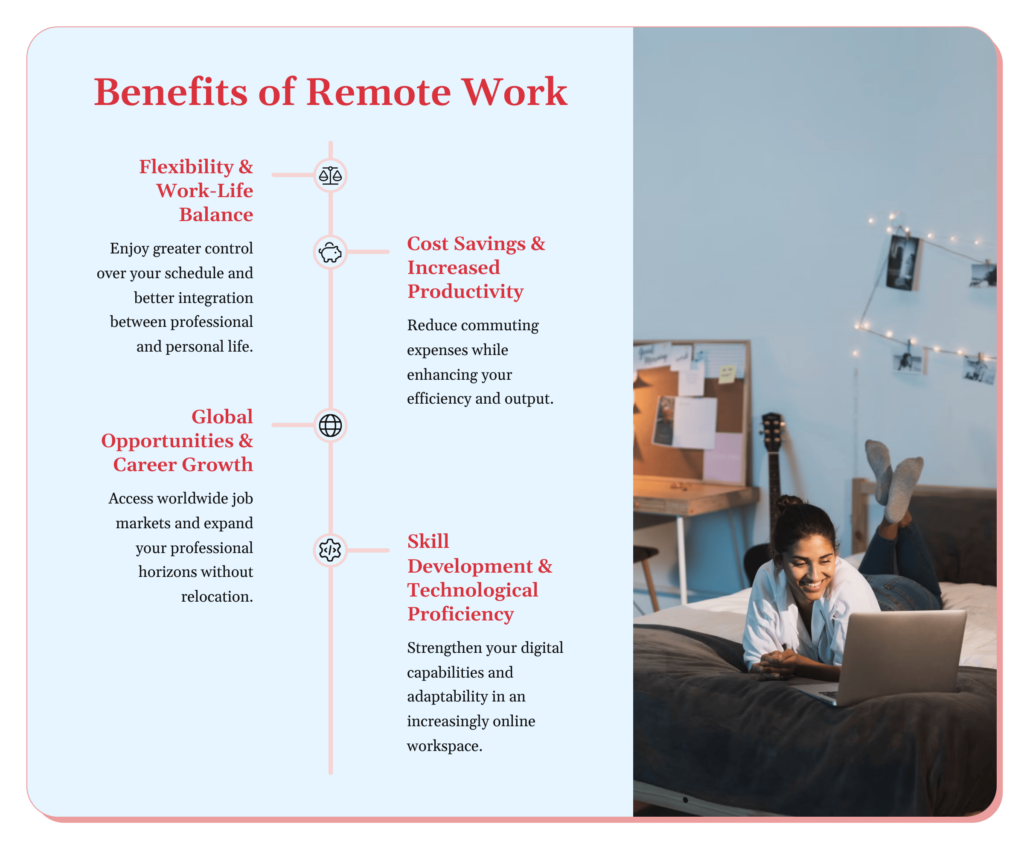

Quick Summary
Why Do You Want to Work Remotely? This question has become increasingly relevant as remote work reshapes the modern job landscape. Remote work refers to performing tasks outside a traditional office setting, offering flexibility and autonomy to employees. The global shift towards digitalization and evolving workplace preferences has fueled the rise of remote opportunities. Since the pandemic, companies have embraced remote models to enhance work-life balance, boost productivity, and improve employee satisfaction.
With India witnessing a major transformation in work culture, remote work is no longer just a trend—it’s a strategic shift. A Forbes article highlights key statistics on how remote work is shaping the future of employment, with projections indicating significant growth by 2025. Whether for better flexibility, cost savings, or improved well-being, professionals now seek remote jobs for various reasons. In this blog, we explore compelling motivations behind choosing remote work and how to craft a strong response to the interview question, “Why Do You Want to Work Remotely?”

Remote work is an appealing choice for many and has changed everything for us. It gives you the freedom to approach your career in the best possible way. We will see the most significant benefits that make remote work a game-changer.
The core answer to why do you want to work remotely lies in flexibility. An excellent work-life balance results in many acceptable outcomes, including reduced stress and burnout and employees’ well-being. Flexible scheduling is the key element that helps employees set boundaries and work hours. It ensures employees prioritize their health, attend to family obligations and set personal goals.
In hindsight, the dreadful thing about working from the office is the daily commute. It affects employees’ lives because of traffic congestion that takes hours to complete the distance. The overcrowding of public transport further exacerbates the stress of daily commute. Avoid lengthy commutes to spend adequate time engaging in hobbies or with the family and towards self-care.
Why do you want to work remotely? Remote work allows for personalized and focused work environments by eliminating office distractions like noise and commute stress. According to a Stanford study, quieter environments and fewer office interruptions led to a 13% increase in remote worker’s productivity. They spend 10% more time on productive tasks than their counterparts in the office.
Here are some more interesting facts, anecdotes & insights analyzed and drawn from studies.
These numbers indicated work-from-home reasons enabling workers to do things better and quicker.
Why do you want to work remotely? : Remote work operating with flexibility can help personally prioritize workers’ well-being and maintain professional productivity. It can empower to create a balanced lifestyle that is increasingly popular among modern professionals.
There are various reasons to work from home, but the most significant advantage is that it can save time and money.

Why do you want to work remotely? : Remote work has changed professionals’ approach toward careers. It offers employees the freedom to thrive professionally by opening up numerous avenues for growth. It fosters independence and a feeling of responsibility for one’s tasks. The leading professional reason for work from home are explained in detail.
Remote work greatly accelerates professional growth by opening up a global job market. It also helps in networking with professionals worldwide. Such expanded reach opens many more opportunities for professionals to apply beyond their geographic location toward career advancement.
Further, remote jobs offer an opportunity to work with individuals from different cultural and professional backgrounds. Broadening one’s experience and fostering innovation also answer the question, “Why do you want to work remotely?”
Working from anywhere but the office raises the issue of the ownership that comes with autonomy. Employees must arrange their tasks, set priorities, and manage deadlines on their own. When answering “Why Do You Want to Work Remotely?”, it’s important to highlight that remote work fosters self-determination and flexibility.
Many remote employees benefit from flexible schedules and the freedom to establish clear goals, manage their time effectively, and continuously assess their achievements. This autonomy not only encourages effective time management and goal-setting but also cultivates a strong sense of ownership and accountability in work roles.
Show your motivational response and confidence when asked, “Why do you want to work remotely?” Structuring a pattern below to craft a practical answer for you:
Sample Answer 1:
“I am excited about remote work as it enables me to create a focused and conducive environment. It helps to tailor to my needs, thus increasing productivity personally and professionally. Flexibility helps me with proper time management, meaning deadlines are always met on time. It creates a healthier balance between work and life that keeps me motivated and energetic. It also allows me to focus on delivering good results while embracing a routine that fosters my overall development”.
Sample Answer 2:
“I prefer remote work because it enhances my efficiency and work-life balance. The ability to work in a customized, distraction-free environment allows me to focus deeply on tasks, leading to higher-quality output. Additionally, I appreciate how remote work fosters a results-driven mindset, emphasizing productivity over time spent at a desk. This approach aligns with my professional values and enables me to contribute meaningfully while maintaining a balanced lifestyle.”
Sample Answer 3:
“Remote work suits my ability to work independently while staying connected with my team through digital tools. I thrive in settings where I can structure my work hours to align with my peak productivity periods, ensuring that I deliver my best work. Moreover, eliminating long commutes saves valuable time, which I can reinvest in skill-building and professional development to stay ahead in my field.”
Sample Answer 4:
“I value the autonomy and responsibility that come with remote work. Being in control of my workspace allows me to stay focused, take ownership of my tasks, and efficiently meet deadlines. Additionally, remote work eliminates unnecessary distractions often found in office settings, enabling me to dedicate my full attention to delivering quality results. Why do I want to work from home? This level of independence and flexibility is crucial for my growth and success.”
Sample Answer 5:
“Remote work is the ideal setup for me as it enhances my creativity, productivity, and motivation. The ability to design a workspace that suits my working style helps me stay engaged and perform at my best. Furthermore, I appreciate how remote work encourages a healthy balance between professional and personal commitments, allowing me to remain energized and committed to delivering exceptional results.”
Follow this framework as a working professional to tailor your response to the job role and company. You can present a compelling answer to your suitability for remote work.

Understanding the advantages of remote work can help you craft a strong response when asked, “Why do you want to work remotely?” Here are some key benefits of working from home for freshers:
One of the main reasons to answer “Why do you want to work remotely?” is the flexibility it offers. Remote work allows freshers to create a schedule that aligns with their peak productivity hours while balancing personal commitments. This autonomy fosters a healthier work-life balance, leading to overall job satisfaction.
When asked “Why do you want to work remotely?” cost savings is a major factor. Freshers can avoid commuting expenses, office attire costs, and daily meal expenses. Working from home reduces financial burdens, making it easier to manage personal expenses while starting a career.
A great response to “Why do you want to work remotely?” is the boost in productivity. Many freshers find they can focus better without the distractions of a traditional office. A personalized and comfortable work environment enhances concentration and efficiency, leading to higher-quality output.
Employers may ask “Why do you want to work remotely?” to assess your motivation for self-growth. Remote work requires strong self-discipline, time management, and effective communication skills. These essential workplace skills help freshers grow professionally and become more independent.
One compelling reason to answer “Why do you want to work remotely?” is the ability to explore global job opportunities. Remote work eliminates geographical limitations, allowing freshers to apply for roles in top companies worldwide, thus broadening their career prospects.
A key benefit when answering “Why do you want to work remotely?” is the reduction in workplace stress. Remote work eliminates long commutes, office politics, and unnecessary distractions, creating a calmer and more focused work atmosphere that supports mental well-being.
If you are passionate about sustainability, mentioning environmental benefits when answering “Why do you want to work remotely?” can be impactful. Eliminating daily commutes reduces carbon emissions, contributing to a greener planet and a more sustainable work culture.
A strong point to consider when answering “Why do you want to work remotely?” is the ability to enhance digital skills. Remote work requires the use of various collaboration tools, improving technological proficiency and preparing freshers for a digitally driven work environment.
Why do you want to work remotely? : Remote work redefines the modern career with flexible working conditions. It boosts productivity and aids personal and professional growth. It also reduces employees’ stress levels and helps drive innovation and global collaboration.
For those interested, remote work is a new wave of working. Efficiency and autonomy are combined with excellent well-being. It is a choice for employees to allow customizing their workspace conducive to them. It leads to focus on something they are passionate about while flourishing in their career.
Explore the possibility of remote work and reflect on your motivations. Whether you want flexibility, health, or career advancement, align your reasons with your professional aspirations. If you’ve ever wondered, why do you want to work from home, consider how it can be a gateway to achieving a harmonious and rewarding lifestyle.
Various reasons to work from home, including flexibility and personalized schedules, contribute to a more efficient and balanced lifestyle. It minimizes commute stress and more personal time, increasing productivity with fewer distractions. Expenses on commuting, meals, and work attire help in cost-saving if calculated wisely.
Working from home allows you to control your work environment, minimizing interruptions from coworkers and unnecessary socializing. It provides the quiet space needed to focus on important tasks without constant disruptions.
A key advantage of remote work is having greater control over task management. Highlight how it supports your ability to take initiative, stay organized, and manage projects independently.
Yes, remote work fosters career growth by offering access to a global job market and enabling networking with professionals worldwide. It enhances skills, broadens one’s expertise, and promotes innovation. It gives exposure to industry knowledge through diverse international collaborations. Subsequently, I will open doors to new roles and mentorships from the comfort of working from home.
Absolutely! Remote work eliminates commutes, saving time and reducing stress. It facilitates flexible schedules to accommodate personal commitments and enhance overall well-being. One can focus on being productive professionally. It discards endless commutes and promotes healthier eating habits and lifestyles. Remote work helps save time, delivering extra time for family, pets, hobbies, and self-care.
Remote and flexible schedules enhance job satisfaction, health, and work-life balance while reducing stress. Employers also benefit from increased productivity, lower turnover, and reduced absenteeism.

Authored by, Rashmi Jaisal
Career Guidance Expert
Rashmi is a Content Strategist who creates research-driven content focused on education, higher education policy, and online learning. She brings an energetic blend of expertise in technology, business, and literature, sparking fresh perspectives and engaging narratives. Outside of work, she’s a passionate traveler who enjoys journaling and curating visual inspiration through Pinterest boards.
Editor's Recommendations
Chegg India does not ask for money to offer any opportunity with the company. We request you to be vigilant before sharing your personal and financial information with any third party. Beware of fraudulent activities claiming affiliation with our company and promising monetary rewards or benefits. Chegg India shall not be responsible for any losses resulting from such activities.
Chegg India does not ask for money to offer any opportunity with the company. We request you to be vigilant before sharing your personal and financial information with any third party. Beware of fraudulent activities claiming affiliation with our company and promising monetary rewards or benefits. Chegg India shall not be responsible for any losses resulting from such activities.